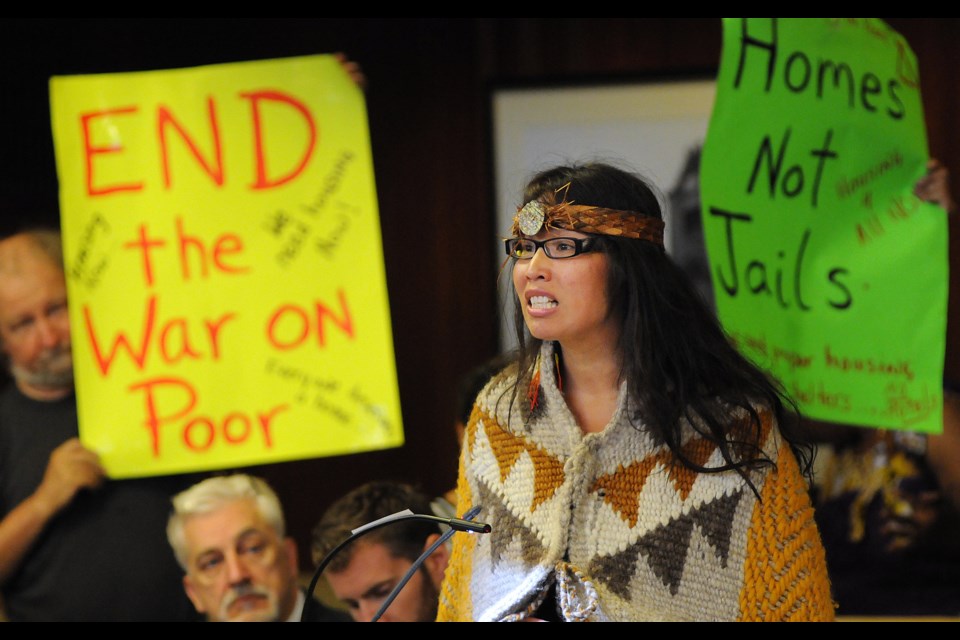Despite the city’s eviction notices, camping protesters at Oppenheimer Park have no intention of leaving.
“I have sworn myself that I’m going to stay here until the last person on our list gets subsidized housing,” said Anthony Guitar, one of four coordinators of the park occupation movement, which they are calling Homes for the Homeless. “If that takes till the [civic] elections in November, so be it.”
On Tuesday, July 15, park rangers handed out eviction notices to people sleeping in Oppenheimer Park. Downtown Eastside residents like Guitar who opposed the eviction occupied the park early Wednesday morning around 1 a.m. in support of their cause. Some residents are in nearby single-room occupancy hotels but have set up tents at the park, arguing the quality of housing in the area has to be improved.
The eviction notice from the city said campers had to remove all permanent structures by 7 a.m. July 20. No force has been used to back up the notice.
“I pay $550 for a dungeon,” said Guitar, who lives in an SRO. “The place is bug infested. There is no air circulating in the building and what not. It’s not properly cleaned. There’s a lot of damage in the building.”
Police and park rangers surrounded Oppenheimer Park Monday morning accompanied by social workers offering shelter beds to homeless campers. Guitar believes the presence was an intimidation tactic.
A statement from the city said it supports “the right to gather and carry out peaceful protest however, our parks are there for the enjoyment of everyone and we are requesting that the structures be removed from Oppenheimer Park.”
In response to the city’s eviction notices, campers served police and park rangers their own eviction notice telling them the land is unceded Coast Salish territory. Guitar said all 25 campers at the site are of indigenous background.
A group of protesters showed up at city hall Tuesday morning to propose a motion at the 9:30 council meeting. Audrey Siegl, a former resident of the Downtown Eastside and a member of the Musqueam Indian Band, read out requests for the city to respect the park as Coast Salish land and to cease issuing evictions for park residents. Siegl said the city needs to better serve homeless residents.
City council agreed to have Coun. Kerry Jang, city manager Penny Ballem and members of senior staff meet with tenters about the situation at the park. The meeting was still in progress at press time Tuesday.
The Courier visited the site around noon Monday.
Allan Lee, who sleeps at various parks and occasional First United Church, spent his first night at Oppenheimer Park on Saturday.
“Most of us, we need homes,” said Lee. “Why send that stuff [evictions] when they should be helping us out... that’s what the government’s supposed to do.”
Despite the evictions and events at the park including the UGM barbecue July 26 and Powell Street Festival August 1 to 3, the group has no intention of moving.
Stella August, an activist from DTES Power of Women, was at the park with other members to support the cause.
“Eviction notices here are illegal,” said August. “They have no authority to take the homeless out of here. This is Indian territory. This is sacred land. We’ll fight tooth and nail to get homes.”
Homes for the Homeless insists Oppenheimer Park isn’t a park, but rather Oppenheimer Field, and campers cannot be evicted. Guitar cited the lack of walk lights and signs with the speed limit of 30 kilometres an hour, which are present at every park.
Guitar said social media has greatly helped boost their cause.
“We’re putting out requests for what we need,” said Guitar. “It’s been a very useful tool. People have been dropping us off water, fruit, vegetables; all the things a person needs. We’re doing very well right now.”
Guitar said the best thing would be for the city to provide everyone at the park with subsidized housing.
“Out of everyone that is staying here we do have a lot of different situations,” said Guitar. “We need to be treated as people and not the way we’re being treated. We’re not being treated with respect. People have to stand up.”
“Places like this ain’t anybody else’s,” added Lee. “It’s everybody’s ground, not just one person.”
—with files from Mike Howell



